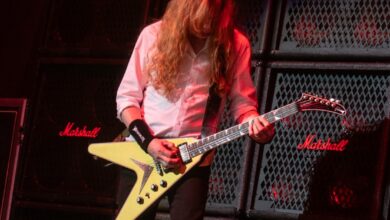Deuce Ignites the Bay: KISS Set Winterland on Fire in San Francisco, 1975
KISS’s performance of “Deuce” in San Francisco is remembered as one of the band’s most electrifying early moments—a night that captured their raw ambition just before superstardom hit. It took place on January 31, 1975, at Bill Graham’s Winterland Ballroom, a venue that had already hosted rock giants from Hendrix to Zeppelin. For KISS, still climbing the ladder and touring in support of Hotter Than Hell, it was both an audition for the rock elite and a declaration that spectacle could be an art form all its own.
That night, “Deuce” wasn’t just a song—it was an explosion of identity. The opening riff hit like a thunderclap, instantly pulling the crowd into sync with Gene Simmons’ bass growl and Peter Criss’s hard-driving snare. The atmosphere was pure chaos in perfect time: confetti, smoke, and that unmistakable low-end rumble that seemed to shake the wooden floorboards. For San Francisco’s notoriously discerning rock audience, KISS wasn’t subtle—but subtlety wasn’t what they came for.
Winterland’s acoustics made the performance unforgettable. The venue’s cavernous interior and reflective walls turned every cymbal crash and guitar squeal into a wall of sound. When Paul Stanley leaned into the mic and shouted for the crowd to “get up and get down,” the roar that came back sounded like a war chant. The energy was circular—band to fans, fans to band—until you couldn’t tell who was leading whom.
The stage setup was primitive compared to KISS’s later stadium tours, yet somehow more dangerous. Flames shot from the front monitors, Ace Frehley’s amps crackled, and Simmons’s eyes caught the stage lights as he prowled forward like a creature that had just discovered its own myth. “Deuce” functioned as both a greeting and a challenge: it was the band’s way of saying, If you’re not ready to lose control, you’re in the wrong room.
For a group still fighting for national radio play, KISS played with the confidence of legends. Stanley’s guitar tone had that metallic snap that cut through the noise, while Frehley’s leads painted streaks of lightning through the fog. Watching the footage today, you can feel the chemistry—each member occupying their corner of the stage like a general commanding their section of the battlefield.
Simmons’s bass work during “Deuce” is what truly anchored the chaos. There’s a precision under the frenzy; every note lands heavy but intentional, locking in with Criss’s snare to drive the band like a steam engine. This was the birth of the “KISS groove,” that rhythmic swagger that would later define an entire generation of arena rock.
Paul Stanley’s charisma was already in full bloom. He strutted across the stage in glittering boots and chest-baring sequins, his guitar slung low like a weapon. Between verses, he gestured dramatically, pointing his pick at the crowd as if to anoint them part of the show. That interplay between seduction and aggression—the rock ‘n’ roll preacher and his congregation—became one of the band’s defining traits.
Ace Frehley’s solos in that performance remain iconic because they were both sloppy and sublime. His fingers danced on the fretboard, bending notes slightly out of pitch before snapping back into perfect timing. He didn’t just play solos; he fought them, making each one sound like a spark caught in a thunderstorm. The crowd, bathed in smoke and flashing lights, cheered like witnesses to an act of rebellion.
Peter Criss, too often underestimated, provided the glue. His drumming that night was muscular yet swinging, channeling the jazz roots he rarely got credit for. In “Deuce,” his fills exploded across toms like machine-gun bursts, propelling the song forward while giving it a human heartbeat. By the time the last cymbal crashed, Criss looked like he’d just gone twelve rounds in a heavyweight bout—and loved every second.
The audience response was immediate and thunderous. Winterland had hosted countless rock icons, but few acts had ever fused theatrics and sound with such total conviction. The crowd wasn’t just clapping—they were shouting, gasping, and laughing between choruses, overwhelmed by the sensory overload. In those moments, KISS had done something few up-and-coming acts ever managed: they turned a skeptical San Francisco audience into true believers.
What made “Deuce” so pivotal was how perfectly it represented everything KISS stood for. The lyrics, written by Simmons, spoke of working hard and playing harder—simple, primal, and universal. The performance magnified that ethos: sweat, noise, and unapologetic attitude. It wasn’t poetry; it was pulse.
The lighting at Winterland deserves mention too. Without the computer-controlled rigs that would define their later tours, KISS relied on old-school spotlights and gels to create drama. When the band locked into the song’s final groove, red and white beams cut through the smoke like a storm warning. You could almost see the air vibrating as Stanley’s guitar swung toward its last chord.
By the time “Deuce” ended, the stage looked scorched—amplifiers humming, fog still rolling, makeup streaked with sweat. The band left the stage in near-silence, the crowd howling for more. In that pause, before the next track began, you could sense history forming: four men in their twenties, still unproven but utterly certain they belonged among giants.
The legacy of that night has grown with each passing year. Bootlegs circulated through the late seventies, traded among fans who spoke about Winterland ’75 in reverent tones. When the pro-shot footage resurfaced decades later, it only confirmed what word of mouth had preserved—the raw power, the danger, the joy.
Today, “Deuce” at Winterland remains the gold standard for what a young, hungry rock band can achieve when every note is played like it might be their last. It’s more than a performance; it’s a moment suspended in time, the exact point when ambition met destiny. Watching it now, half a century later, one thing is still clear: in 1975, under those burning lights in San Francisco, KISS didn’t just play “Deuce”—they became it.





